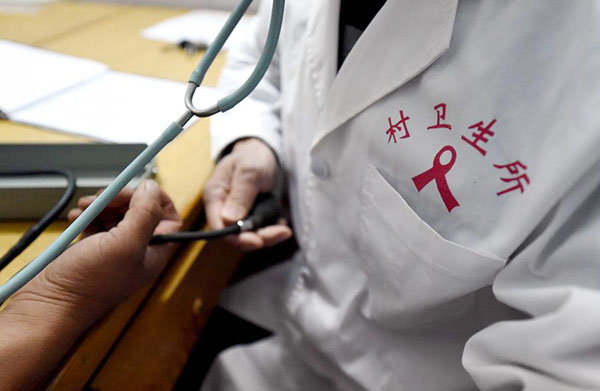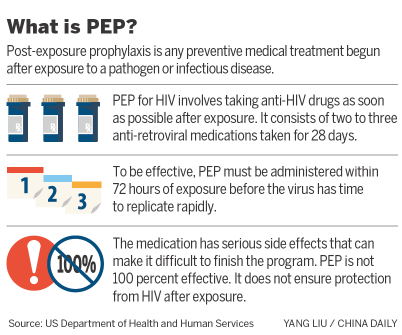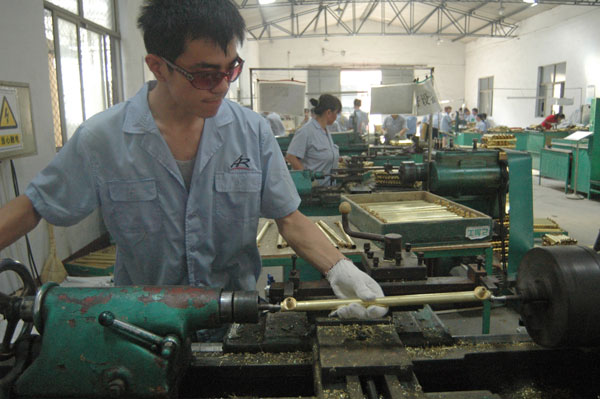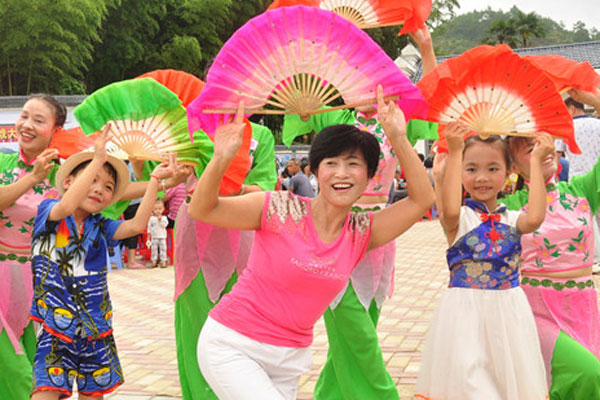Rule covers HIV as work hazard
Updated: 2015-08-03 07:37
By Shan Juan(China Daily)
|
|||||||||||
Catching the disease recognized as an occupational risk; health workers get increased protection
 |
|
An HIV positive patient, not pictured, receives a blood pressure test in Weishi county, Central China's Henan province in this Nov 30, 2015 file photo. [Photo/Xinhua] |
China's top health authority has issued a regulation recognizing HIV as an occupational hazard in some professions.
The move by the National Health and Family Planning Commission standardizes responses to occupational HIV exposure to better protect the rights of health workers and to curb AIDS-related discrimination, according to the nation's top AIDS specialist.
The regulation, which takes effect immediately, mainly covers jobs in medicine, public security and judicial departments, said Wu Zunyou, director of the National Center for AIDS/STD Control and Prevention.
As prostitution is illegal in China, the regulation does not cover prostitutes.
Under the regulation, those exposed to the disease will be given a treatment called post-exposure prophylaxis, which involves taking anti-HIV medication as soon as possible to try to reduce the chances of becoming HIV positive.
Such medication prevents HIV from spreading through the body.
The center says 8,339 such cases of HIV exposure were reported between 2004 and last year. None led to infections.
Wu said, "The initiative is aimed at better protecting the rights of staff members in occupations at greater risk of HIV, and to clearly define responsibilities and compensation claimed in accidents involving infected medics at work."
HIV/AIDS sufferers will also benefit, as the regulation will help to ease health workers' safety concerns about treating them, reducing the number of cases where treatment is denied at hospitals, Wu said.
In 2012, Beijing AIDS patient Xiao Feng faked his medical records and hid his HIV status to receive treatment for cancer, triggering widespread attention and discussion.
Wu said medical workers are at greater risk of HIV exposure, as they handle sharp medical instruments, infected blood and other bodily fluids. They are also under great mental and physical pressure after any exposure.
Since 2008, China has reported an average of 900 cases a year of potential HIV exposure, mostly among doctors, nurses and public security staff, Wu said.
After risk assessment, 77.4 percent were given post-exposure prophylaxis treatment, but this is not available to the public in cases of exposure to HIV through sex.
"There are also side-effects from the PEP treatment," Wu said. "These, coupled with low awareness, have been blamed for treatment being denied to patients. I think the latest initiative will help to address this."
However, Meng Lin, an AIDS patient in Beijing, disagrees, citing concerns over privacy.
"In clearly defining the responsibilities involved in such incidents, the introduction of the regulation will further normalize HIV screening, particularly before surgery, he said. "And that's not 'informed and voluntary' as the law stipulates.
"It's common practice to test surgery patients for HIV without informed consent," he said.
"This might lead to more unintended exposure of patients' status by medical institutions."

Related Stories
8,000 HIV patients at risk as medicine runs out 2015-07-22 07:55
Unusual HIV found in Myanmar truck driver 2015-07-03 07:52
HIV patients face medication shortage 2015-05-29 07:36
Health official defends hospital in girl's HIV infection 2015-01-20 17:40
Today's Top News
Greek stock market tumbles after five-week shutdown
Malaysia seeks help to widen search for MH370
Beijing to ban vehicles for V-Day parade
Realty firms in Europe brace for influx of Chinese buyers
China's Bohai bids $2.6 billion for aircraft leasing firm Avolon
Rule covers HIV as work hazard
Probable MH 370 debris to be studied in Toulouse
Beijing makes it, again!
Hot Topics
Lunar probe , China growth forecasts, Emission rules get tougher, China seen through 'colored lens', International board,
Editor's Picks

|

|

|

|

|

|






